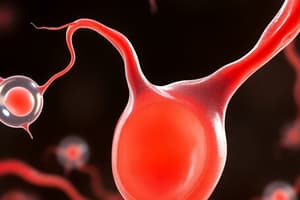Podcast
Questions and Answers
What is the primary function of Sertoli cells in seminiferous tubules?
What is the primary function of Sertoli cells in seminiferous tubules?
- To differentiate into sperm cells
- To support and nourish spermatogonia (correct)
- To produce seminal fluid
- To undergo meiosis
At what stage of spermatogenesis do spermatogonia become primary spermatocytes?
At what stage of spermatogenesis do spermatogonia become primary spermatocytes?
- At the time of sperm maturation
- After differentiation
- During meiosis II
- Following mitotic division (correct)
What is the chromosome configuration of a secondary spermatocyte after the first meiotic division?
What is the chromosome configuration of a secondary spermatocyte after the first meiotic division?
- n 2c (correct)
- 2n 2c
- 2n 4c
- n 1c
How many functional sperm cells are produced from one primary spermatocyte after the completion of spermatogenesis?
How many functional sperm cells are produced from one primary spermatocyte after the completion of spermatogenesis?
What initiates the spermatogenesis process in mammals?
What initiates the spermatogenesis process in mammals?
What characterizes the mature sperm cell in terms of its cytoplasm?
What characterizes the mature sperm cell in terms of its cytoplasm?
Which of the following statements about the duration of spermatogenesis is true?
Which of the following statements about the duration of spermatogenesis is true?
Which cells directly develop from spermatids during spermatogenesis?
Which cells directly develop from spermatids during spermatogenesis?
What is the final product of oogenesis?
What is the final product of oogenesis?
What occurs during the first meiotic division in oogenesis?
What occurs during the first meiotic division in oogenesis?
How many chromosomes does a primary oocyte have at the start of oogenesis?
How many chromosomes does a primary oocyte have at the start of oogenesis?
During which phase of meiosis do the chromatids separate?
During which phase of meiosis do the chromatids separate?
In oogenesis, how many functional gametes result from one oogonium?
In oogenesis, how many functional gametes result from one oogonium?
What is the significance of unequal cytokinesis in oogenesis?
What is the significance of unequal cytokinesis in oogenesis?
At what point does meiosis begin in oogenesis?
At what point does meiosis begin in oogenesis?
What occurs during metaphase II of oogenesis?
What occurs during metaphase II of oogenesis?
What is the primary role of the polar bodies produced during oogenesis?
What is the primary role of the polar bodies produced during oogenesis?
How many haploid cells are produced after the complete maturation of a primary oocyte?
How many haploid cells are produced after the complete maturation of a primary oocyte?
What phase of gametogenesis marks the transition from diploid to haploid cells?
What phase of gametogenesis marks the transition from diploid to haploid cells?
What is the purpose of the oviduct in relation to the secondary oocyte?
What is the purpose of the oviduct in relation to the secondary oocyte?
During oogenesis, what happens to the first polar body after its formation?
During oogenesis, what happens to the first polar body after its formation?
What is the role of the maternal cytoplasm in the mature ovum?
What is the role of the maternal cytoplasm in the mature ovum?
How many gametes result from one spermatogonium compared to one oogonium?
How many gametes result from one spermatogonium compared to one oogonium?
What chromosomal configuration do primary spermatocytes have?
What chromosomal configuration do primary spermatocytes have?
What type of division do secondary spermatocytes undergo to produce spermatids?
What type of division do secondary spermatocytes undergo to produce spermatids?
At what stage does the spermatogonia begin the process of spermatogenesis?
At what stage does the spermatogonia begin the process of spermatogenesis?
How many haploid cells result from one primary spermatocyte after completing both meiotic divisions?
How many haploid cells result from one primary spermatocyte after completing both meiotic divisions?
What is the role of Sertoli cells during spermatogenesis?
What is the role of Sertoli cells during spermatogenesis?
What happens to spermatids after they are produced?
What happens to spermatids after they are produced?
What characteristic of mature sperm cells differentiates them from earlier stages?
What characteristic of mature sperm cells differentiates them from earlier stages?
What is the total duration of spermatogenesis in humans?
What is the total duration of spermatogenesis in humans?
What is the chromosomal composition of spermatids after meiosis II?
What is the chromosomal composition of spermatids after meiosis II?
What initiates the transition of spermatogonia to primary spermatocytes?
What initiates the transition of spermatogonia to primary spermatocytes?
What happens to the chromosome number during the first meiotic division in oogenesis?
What happens to the chromosome number during the first meiotic division in oogenesis?
Which cell type is produced at the end of the second meiotic division in oogenesis?
Which cell type is produced at the end of the second meiotic division in oogenesis?
How many polar bodies are formed during the complete maturation of one oogonium?
How many polar bodies are formed during the complete maturation of one oogonium?
Which process contributes only genetic material during fertilization?
Which process contributes only genetic material during fertilization?
At which stage of oogenesis does the primary oocyte not complete its division?
At which stage of oogenesis does the primary oocyte not complete its division?
During which phase does the number of chromosomes become haploid in oogenesis?
During which phase does the number of chromosomes become haploid in oogenesis?
What is the total duration of oogenesis throughout a woman's reproductive life?
What is the total duration of oogenesis throughout a woman's reproductive life?
What type of cell is formed during cytokinesis in oogenesis?
What type of cell is formed during cytokinesis in oogenesis?
Which of the following describes the fate of polar bodies in oogenesis?
Which of the following describes the fate of polar bodies in oogenesis?
What is the end result of fertilization in terms of chromosome number?
What is the end result of fertilization in terms of chromosome number?
Flashcards are hidden until you start studying
Study Notes
Spermatogenesis
- Spermatogenesis is the process of male gamete production.
- Starts at puberty (age 10-14) and continues until death.
- Occurs in the seminiferous tubules of the testes.
- Sertoli cells support and nourish the spermatogonia.
- Spermatogonia are diploid cells (2n 2c).
- Stages of Spermatogenesis:
- Proliferation: Spermatogonia undergo mitotic divisions.
- Growth: Spermatogonia become primary spermatocytes (2n 4c).
- Maturation:
- Meiosis I: Homologous chromosomes separate, forming secondary spermatocytes (n 2c).
- Meiosis II: Sister chromatids separate, forming spermatids (n c).
- Differentiation: Spermatids transform into sperm cells.
- Takes about 64 days for the full cycle.
Oogenesis
- Oogenesis is the process of female gamete production.
- Starts during embryonic development and continues until menopause.
- Oogonia develop from primordial germ cells and undergo mitotic divisions.
- Stages of Oogenesis:
- Proliferation: Oogonia undergo mitosis.
- Growth: Oogonia become diploid primary oocytes (2n 4c).
- Maturation:
- Meiosis I: Starts before birth, pausing in prophase I, and finishes with ovulation, forming a haploid secondary oocyte (n 2c) and a smaller first polar body.
- Meiosis II: Completes after fertilization, resulting in a haploid ootid (n c) and a second polar body.
- Only one mature ovum is produced from each oogonium.
Differences between Spermatogenesis and Oogenesis
- Time-span: Spermatogenesis takes 60-70 days, while oogenesis can last decades.
- Number of cells: Spermatogenesis produces 4 sperm cells from one spermatogonium. Oogenesis produces one ovum and 3 polar bodies from one oogonium.
- Intensity: Spermatogenesis produces millions of sperm cells per ejaculate, while oogenesis produces one ovum per menstrual cycle.
Changes in Chromosome Number and Chromatids during Gametogenesis
| Cell Type | Number of Chromosomes (n) | Number of Chromatids (c) |
|---|---|---|
| Spermatogonium | 2 | 2 |
| Oogonium | 2 | 2 |
| Primary Spermatocyte | 2 | 4 |
| Primary Oocyte | 2 | 4 |
| Secondary Spermatocyte | 1 | 2 |
| Secondary Oocyte and First Polar Body | 1 | 2 |
| Spermatid | 1 | 1 |
| Ootid and Secondary Polar Body | 1 | 1 |
| Sperm | 1 | 1 |
| Ovum | 1 | 1 |
| Zygote | 2 | 2 |
Meiosis
- Metaphase I vs. Metaphase II: Metaphase I involves pairing of homologous chromosomes at the equator, while Metaphase II involves alignment of individual chromosomes (sister chromatids still attached) at the equator.
- Anaphase I vs. Anaphase II: Anaphase I separates homologous chromosomes, while Anaphase II separates sister chromatids.
- Prophase I: Contains 23 bivalents (paired chromosomes), 46 chromosomes, and 92 chromatids.
- Homologous chromosomes separate during Anaphase I.
- Sister chromatids separate during Anaphase II.
- The number of chromosomes becomes haploid (n) at the end of Meiosis I.
- Fertilization restores the diploid number of chromosomes.
Additional Information:
- Unequal cytokinesis during oogenesis ensures the ovum has a large cytoplasm for embryo development.
- Fertilization is the union of sperm and egg, forming a zygote.
- Zygote undergoes mitotic division, producing embryo cells for tissue and organ development.
Spermatogenesis
- Spermatogenesis is the process by which male spermatogonia develop into sperm cells.
- It begins at puberty (around 10-14 years old) and continues throughout a man's life.
- Occurs in the seminiferous tubules of the testes.
- Spermatogenesis involves a series of mitotic and meiotic divisions.
- Spermatogonia are the earliest stage of sperm cell development, containing a diploid number of chromosomes (2n 2c).
- Primary spermatocytes form after a series of mitotic divisions, and contain 2n 4c chromosomes.
- Secondary spermatocytes are formed after the first meiotic division (reduction division) and contain n 2c chromosomes.
- Spermatids are produced as a result of the second meiotic division (equatorial division) and contain n c chromosomes.
- Mature sperm cells are fully differentiated from spermatids.
- The entire cycle of spermatogenesis takes approximately 64 days.
Oogenesis
- Oogenesis is the process by which female oogonia develop into egg cells.
- Oogonia develop from primordial germ cells during the first months of embryonic development.
- Oogonia undergo mitosis and become surrounded by nutrient cells, forming a follicle.
- Primary oocytes form at the third month of prenatal development, with diploid chromosomes (2n 4c).
- Meiosis starts before a girl's birth but pauses in prophase I.
- At puberty, ovulation cycles begin, with the maturation of one or a few follicles.
- The first meiotic division completes during ovulation.
- Secondary oocytes are formed from the first meiotic division, containing n 2c chromosomes.
- The first polar body, a smaller cell, is also produced during this division.
- The second meiotic division continues, resulting in the production of a haploid ootid (n c) and a secondary polar body.
- The ootid differentiates into an egg cell (n c).
- Polar bodies are essentially non-functional and degrade.
- Unequal cytokinesis during oogenesis results in a large egg cell provisioned for embryonic development.
Key Differences between Spermatogenesis and Oogenesis
- Oogenesis begins before birth, while spermatogenesis starts at puberty.
- Oogenesis is a much slower process than spermatogenesis.
- A single oogonium gives rise to one mature ovum, while one spermatogonium produces four mature sperm cells.
- The rate of gamete formation in oogenesis is much lower than in spermatogenesis (one ovum per menstrual cycle versus 100-200 million sperm cells per ejaculate).
Chromosomal Changes During Gametogenesis
| Cell Type | Number of Chromosomes (n) | Number of Chromatids (c) |
|---|---|---|
| Spermatogonium | 2 | 2 |
| Primary Spermatocyte | 2 | 4 |
| Secondary Spermatocyte | 1 | 2 |
| Spermatid | 1 | 1 |
| Sperm | 1 | 1 |
| Oogonium | 2 | 2 |
| Primary Oocyte | 2 | 4 |
| Secondary Oocyte & First Polar Body | 1 | 2 |
| Ootid & Secondary Polar Body | 1 | 1 |
| Ovum | 1 | 1 |
| Zygote | 2 | 2 |
Meiosis
- Metaphase I: Homologous chromosomes align at the metaphase plate.
- Anaphase I: Homologous chromosomes separate and move to opposite poles of the cell.
- Metaphase II: Sister chromatids align at the metaphase plate.
- Anaphase II: Sister chromatids separate and move to opposite poles of the cell.
Key Points
- Meiosis is a reduction division, reducing the chromosome number from diploid to haploid.
- During prophase I, a bivalent contains 2 chromosomes and 4 chromatids.
- Homologous chromosomes separate during anaphase I.
- Sister chromatids separate during anaphase II.
- The haploid chromosome number is reached at the end of meiosis I.
- Fertilization restores the diploid chromosome number, resulting in the formation of a zygote.
Studying That Suits You
Use AI to generate personalized quizzes and flashcards to suit your learning preferences.




